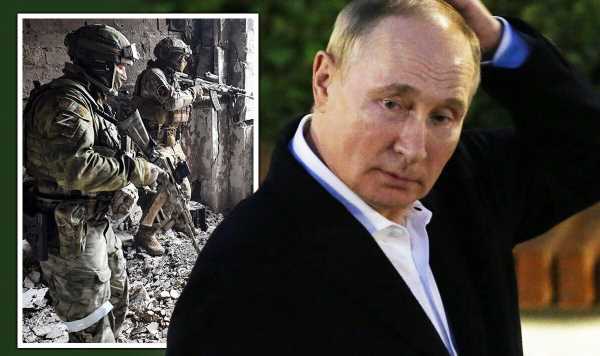Russian soldiers fear launching attacks as morale plunges
Richard Dannatt says mass mobilisation is ‘backfiring on Putin'
We use your sign-up to provide content in ways you’ve consented to and to improve our understanding of you. This may include adverts from us and 3rd parties based on our understanding. You can unsubscribe at any time. More info
The supply of medicines to Russian troops in Ukraine is “probably” getting worse and lowering morale, the Ministry of Defence has said. Defence Intelligence also reports today (September 30) that medical training and first aid awareness is likely to be “poor”. British defence specialists say a lack of medical supplies is contributing to “declining” morale among Russian soldiers and a lack of willingness to fight.
The statement says: “Medical provision for Russian combat troops in Ukraine is probably growing worse. Some newly mobilised Russian reservists have been ordered to source their own combat first aid supplies, with the advice that female sanitary products are a cost effective solution.
“Medical training and first-aid awareness is likely poor. Some [Russian] troops have obtained their own modern, Western-style torniquets (sic) but have stowed them on their equipment using cable-ties, rather than with Velcro provided – probably because such equipment is scarce and liable to be pilfered. This is almost certain to hamper or render impossible the timely application of torniquet (sic) care in the case of catastrophic bleeding on the battlefield.”
Defence Intelligence’s statement ends saying Russian troops’ lack of confidence in sufficient medical provision is almost certainly contributing to a “declining state of morale” and a lack of willingness to undertake offensive operations in many units in Ukraine.
The latest briefing comes after Russia’s President Vladimir Putin said on Thursday “all mistakes” made in the call-up to reinforce Moscow’s military operation in Ukraine should be corrected.
It was his first public acknowledgment that the “partial mobilisation” he announced last week had not gone according to plan.
There have been widespread public expressions of discontent from officials and citizens over the way the mobilisation has been handled, including complaints about enlistment officers sending call-up papers to ineligible men.
Thousands of men have fled Russia to avoid the draft, which was billed as enlisting people with military experience and required specialities.
However, it has often appeared oblivious to individual service records, health, student status or even age.
Some 2,000 people have also been arrested at unsanctioned, anti-war protests in more than 30 towns and cities. Some of them were swiftly given call-up papers in moves the Kremlin said were perfectly legal.
READ ABOUT UKRAINE SET TO ENCIRCLE A KEY CITY
Putin said: “In the course of this mobilisation, many questions are coming up, and all mistakes must be corrected and prevented from happening in the future.
“For example, I’m thinking of fathers of many children, or people suffering from chronic diseases, or who those who are already past conscription age.”
The announcement of Russia’s first public mobilisation on September 21 has come under fire from the Kremlin’s own supporters, almost unheard of inside Russia since Putin sent his troops into Ukraine seven months ago.
The pro-Kremlin editor of Russia’s state-run RT news channel, Margarita Simonyan, has said: “They’re infuriating people, as if on purpose, as if out of spite. As if they’d been sent by Kyiv.”
DON’T MISS:
Question Time blasted for ‘true blue’ bias [LATEST]
Lord Frost takes aim at Truss’ detractors and issues PM warning [REPORT]
‘The pound has plummeted!’ Biden administration hits out at Truss [REVEALED]
Kremlin spokesman Dmitry Peskov acknowledged on Monday some call-ups had been issued in error, saying mistakes were being corrected by regional governors and Russia’s Defence Ministry.
Putin held back from assigning blame for the errors – either to the ministry, led by his close ally Sergei Shoigu, or to the regional officials entrusted with deciding precisely who call-up papers should go to.
Shoigu said last week Moscow planned to enlist only 300,000 personnel. The Kremlin later denied a report by the independent Novaya Gazeta Europe that an undisclosed clause in Putin’s mobilisation decree provided for one million reservists to be called up.
Meanwhile, Finland announced yesterday (September 29) it would close its border to Russian tourists, closing off the last direct land route to the European Union.
Almost 17,000 Russians crossed the border into Finland last weekend.
Helsinki said the move would result in a significant drop in cross-border traffic.
The decision means the Finnish Government, wary of being a transit nation into western Europe’s passport-free Schengen zone, joined the other EU member countries sharing land borders with Russia which had already barred Russian tourists.
EU bans were part of a series of sanctions and other steps taken against Moscow by the West since the invasion of Ukraine.
The Baltic states and Poland argued that Russian tourists posed a national security threat. Estonia had expressed frustration Finland had not joined them. Kyiv has said Russians should stay at home and seek to stop the war.
The EU has banned all flights from Russia, leaving only rail and road transport links available. This month it agreed to limit issuing free-travel Schengen zone visas.
Source: Read Full Article







